
With Sophie's Choice new to streaming on HBO NOW and Frances available to rent from Amazon, Youtube and others, we thought it could be fun to rehash one legendary Oscar race. It's when Meryl Streep and Jessica Lange battled out for the Best Actress trophy of 1982. Come explore this clash of acting titans as we investigate two great women's legacies, the pair of competing films and nominated performances in a detailed deep dive. In the end, who'll be the chosen victor?
THE CONTENDERS
Despite being the same age and having entered the movie business at relatively the same time, by 1982, Meryl Streep and Jessica Lange were viewed very differently by the public and the industry.
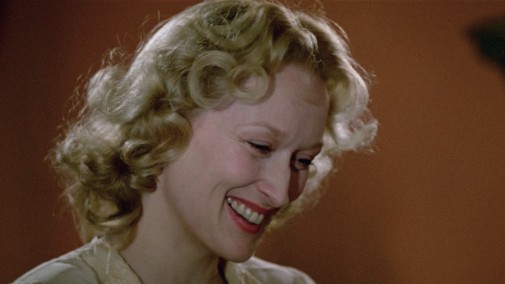
The theatrically trained Streep was a respected young thespian who had already amassed three Oscar nominations and one win. She'd even starred in two Best Picture winners (The Deer Hunter, Kramer vs Kramer), signaling her as a performer of great prestige. Thanks to various factors, Streep was always considered an actress first, a star second, her persona never tied to notions of glamour or ephemerous desirability. In the beginning, that may have hurt her, but this sense of respectability would prove valuable to her career.
However, before landing her first movie role in 1977's Julia, Meryl Streep's un-glamorousness would cost her the lead part in Dino De Laurentiis' King Kong remake. According to the actress herself, she was rejected by the producer for being too ugly. The role went to Jessica Lange, instead, who had been modeling professionally until then. That pricey adventure flick might have made Lange famous, but it also resulted in great infamy for the actress whose miscalculated performance was ridiculed by critics and general audiences alike.
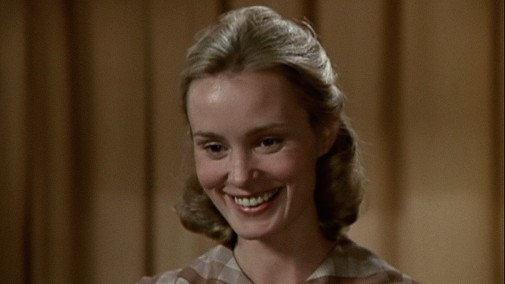
After years of inauspicious work, Jessica Lange in the early 80s was finally beginning to rid herself of the public persona of a dimwitted blonde with more beauty than talent. First, there was her turn as an Angel of Death in Bob Fosse's All That Jazz, and next a remake of The Postman Always Rings Twice for which she received some positive notices, though the role was still tied to the pervasive idea of a bombshell. Perceptions of Lange all changed in December 1982, when Frances and Tootsie premiered in the space of two weeks and proved to all that she was an actress of undeniable range and ability. The surprise factor also helped.
THE MOVIES
Adapted from a homonymous novel by William Styron, Sophie's Choice isn't the story of Zofia "Sophie" Zawistowski, no matter what the title may imply. She's not the film's true protagonist either, rather she's its subject matter. The actual protagonist of this sorry tale is Stingo, played by Peter MacNicol, a young wannabe southern novelist who's newly arrived in 1947's New York. It's through his eyes that we meet Sophie, a Polish concentration camp survivor, and her schizophrenic boyfriend, Nathan.
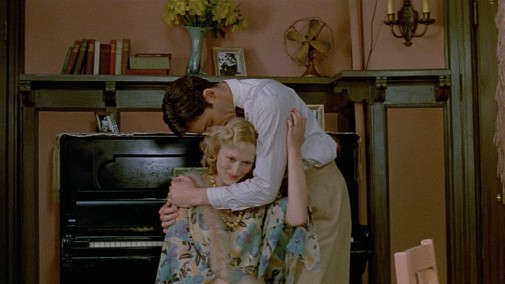
The problem with this structure is that Stingo is a deeply uninteresting figure whose sheer banality makes the detours into Holocaust remembrance feel out of place and exploitative. Because of her narrative placement, Sophie and her bottomless misery become plot mechanisms in Stingo's come-of-age tale. Her life thus reduced to a tragic chapter in a young man's biography.
The filmmakers at least seem aware of this. They are constantly bringing the camera back to Sophie, shooting Streep in close-ups for long stretches, inviting us to be as besotted with the actress as they are. Such an approach might work momentarily, but it doesn't fix the movies' textual problems and, surprisingly, neither Pakula nor any of his accomplished collaborators can spruce up the material into something aesthetically valuable. All in all, Sophie's Choice is an endless drudge, crass and borderline misery porn.
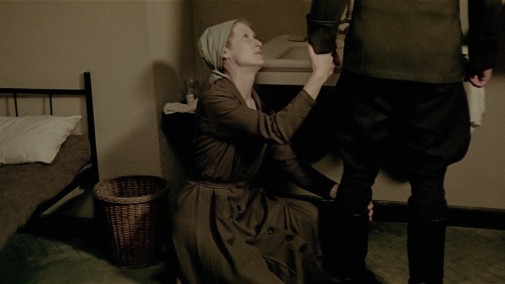
A generous viewer might see the film as an admittance of defeat when faced with the calamity of the Holocaust. Sophie is destroyed by her experiences, jumping into abusive relationships and self-martyrizing out of survivor's guilt. She goes to the extremes of rewriting her life story, lying even to herself. Nathan's dementedness, on the other hand, is fueled by the collective trauma of History. Together, they are a world destroyed by the evil of Humankind that the Holocaust laid bare.
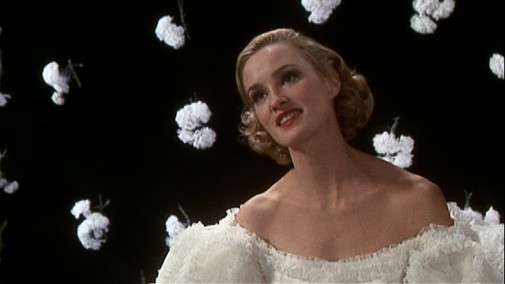
Quite obviously, I'm not a generous viewer for I find Sophie's Choice to be a deep dark pit of joyless mediocrity.
Not that Frances is a masterpiece, it must be said. Still, it's miles better than the Pakula flick. Telling the story of tragic Hollywood starlet Frances Farmer, this is a biopic that takes to heart the idea of printing the legend instead of the facts. Large portions of Farmer's biography are altogether omitted while some tragic events, like the film's memorable lobotomy scene, are pure invention.
That said, there's something in the picture that makes it come alive. It can be ham-fisted and shockingly unsubtle at times, but its emotional intensity makes up for that. During latter passages, when parental oppression and the horror of chauvinistic doctors turn Frances' life into a living hell, it's almost difficult to breathe. One feels suffocated by the agony onscreen and it's hard to disengage, to distance ourselves. The secret to Frances's success is, of course, Jessica Lange's titanic work, which brings us to the matter of the nominated performances themselves.
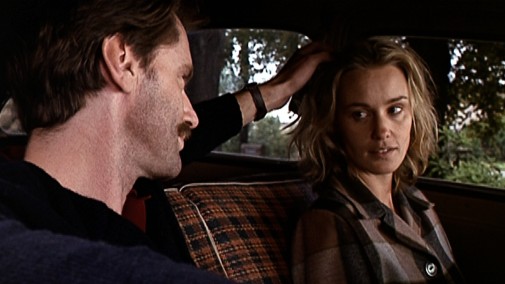
THE PERFORMANCES
Pasty, blond and often dressed in diaphanous fabrics, Meryl's Sophie looks like a ghost fluttering about in her Brooklynite abode. We first meet this spectral entity in the stairs of that pink-walled house, during a caustic fight with Nathan who screams at her with distilled vitriol. From minute one, she's a victim in the eyes of Stingo and the audience, a poor soul in need of rescue. However, it soon becomes clear that she's used to such violence and that this state of affairs isn't necessarily unwanted by Sophie, at least on a subconscious level.
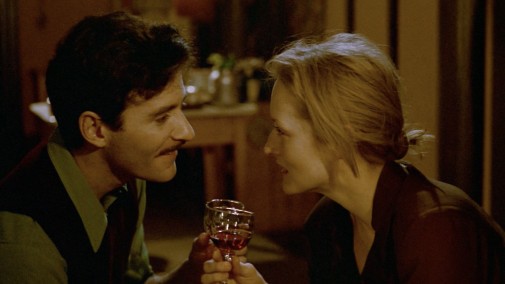
You see, Sophie doesn't love Nathan despite his disdain. She loves him because of it. In a way, he reflects what she believes is true about herself but doesn't dare verbalize – that she deserved to die and should be hated. In the day after that explosive fight, when the reconciled couple takes their newest acquaintance to an afternoon of goofing around in Coney Island, Streep peppers the enjoyment with notes of unrest. Sophie is often awkward, visibly forcing on a mask of cheeriness when she thinks it's appropriate. A longtime victim of domestic abuse, she is tentative around Nathan, constantly trying to find a safe path through his moods.
At the same time, it's because of his presence that we get to see rare flickers of genuine joy from her. During a sleepless night, she sits with Stingo telling the story of her arrest back in Nazi-occupied Poland, her face a sculpture of despondence. That is until she hears Nathan returning home after an unexpected absence. Then, she lights up and it's such a violent tone shift that it could induce whiplash. Streep, for her part, makes it feel natural, finding truth in her character's contrasts and incongruences. The difficulty of this effort is multiplied by the fact she has to do all this while performing an insane dance of linguistic fortitude.
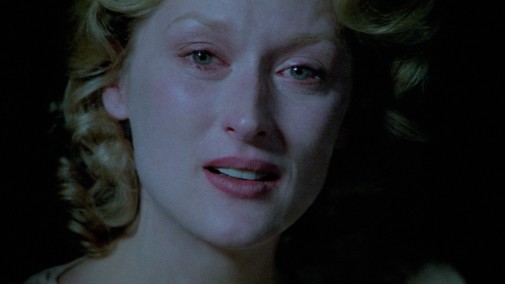
As Sophie, the actress spends most of the film talking in heavily-accented English, but, during the flashbacks, she also needs to express herself in Polish and German. I'm not fluent in either of those latter languages, but Streep's mastery of them has been mostly uncontested since 1982. Moreover, when speaking in her character's non-native tongues, she talks like someone who is translating everything in her head, breaking mid-sentence at precise moments. It's a studiously constructed miracle of acting.
There's very little that's intuitive about this performance, though. Everything but the Choice scene feels calculated to exhaustion but that suits Sophie, who's always negotiating difficult situations – either fictionalizing her life in censored reminiscence, dealing with a paranoid schizophrenic, placating the advances of a foolish boy or trying to manipulate people that can easily have her killed for so much as looking them the wrong way. Yes, we can see all the clicks of the mechanism inside her head, but that's perfect for Sophie. And yes, the Choice scene is as amazing as it is horrifying, a spectacle of sordidness.
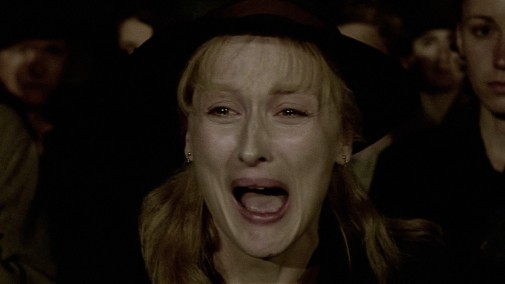
We witness as Sophie slowly realizes what's happening and then makes an impulsive decision. It's a nightmare and Meryl's silent scream, her face distorted into a vision of anguish by Edvard Munch, is unforgettable. She might be overstudied in the 1947 scenes, but we'd argue that's the point of the characterization. That is until she gives up the ghost and finally confesses her most shameful deed. It's fitting that only in that moment of unvarnished honesty, when her memory appears in its truest form, does Streep's performance lose the sheen of technical virtue and become something more savage, almost animalistic in its pain.
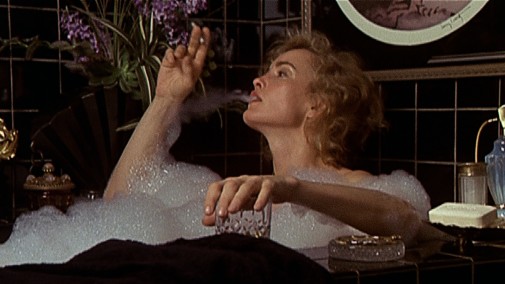
Speaking of savage, that's an apt description for Jessica Lange in Frances. If Streep sometimes feels like she's depending on too carefully balanced technique, Lange feels utterly overwhelmed. Her Frances Farmer is humanity unraveled, both as a woman inside the narrative and as a performance, as if Frances is taking hold of Lange like a demonic possession. After years hiding her trademark mercurial rage behind a veneer of shallow glamour, Jessica Lange finally lets it all hang out, defying anyone to turn away from this supernova of fire and fury, deep indignation and bottomless sorrow.
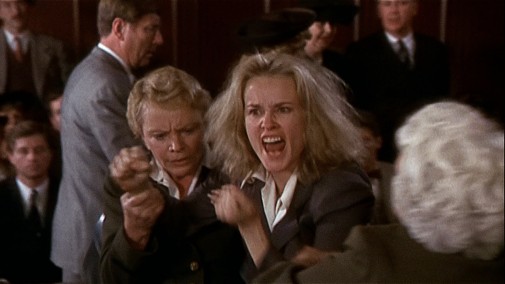
Such words can suggest a false dichotomy between Streep and Lange, painting one as an accomplished technician and the other as an inspired wild child with little finesse and a lot of feeling.
"I don't want to see you act desperate – I want you to BE desperate" is what Clifford Odets tells Frances in one of the movie's scenes. Lange follows the advice wholeheartedly. However, she doesn't sacrifice complexity to do so, nor does she create her characterization without some fine-tuned technique. It's a perfectly calibrated performance that only feels out of control.
In many ways, Lange, who takes the character from teenage innocence to midlife apathy, plays Frances as a woman whose body and mind are essentially disconnected. So many times, we can see her physicality telegraph something opposite to her facial expressions, her voice giving strange colorations to a dialogue that's otherwise performed with no perceived dramatism. By playing up these divorced facets of a person, Lange is making the audience aware of Frances' thinking, her mind, and her soul.
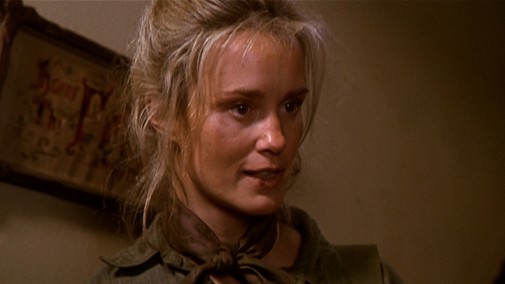
Early on, she is often tense and uncomfortable when dealing with authority figures, her eyes fidgeting about, brow restless and mouth quivering. Her lines express confidence, but the actress' face suggests silent doubt. Only when drunk on libertine abandonment, the passion of a crush or the self-righteous fury of an intelligent person living among idiots, does she calm down that persnickety bearing. In those rare instances, we see Frances and Lange giving themselves over to a single emotion, either relishing in it or using the feeling as a cannonball shot at their enemies.
This movie version of Frances Farmer is doomed by her intellect and she gradually becomes aware of this, growing out of her youthful insecurity into the melodramatic persona of a performer. However, such developments also come hand in hand with romantic disquiet and alcoholism, giving Lange new notes to add to her already complicated symphony. What she does with them is a miracle of feverish obstinance, turning a courtroom scene into a stage. Frances knows she's guilty but she also knows she's being discriminated against because she's female. Furious and loving the operatic buffet of the procedures, she knowingly surrenders to beastly hysteria. Lange plays this with gusto but always delineates these disparate layers of personhood.
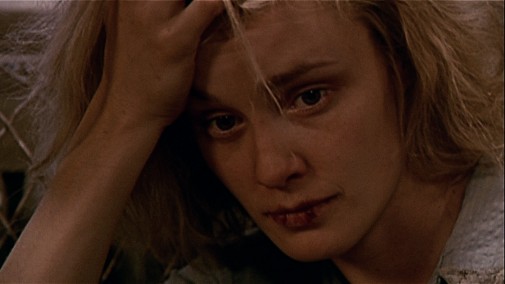
As captivating as she is bullish, the actress makes us understand why Hollywood still tried and tried again to deal with Frances Farmer. Even ragged drunk, her hair in disarray and face ashen, she's a star who we can never ignore. To see that bright charisma be systematically smothered by stints at draconian mental hospitals is a terrifying pageant of degradation. Jessica Lange doesn't spare the audience nor does she glamorize the ordeal, continuously finding new variations to Frances' despair. The structure of the movie may be repetitive, but its lead actress never is.
After many cycles of narcotized stupors, mother-daughter wars, and battered resignation, Lange and her movie arrive at their most famous chapter – the lobotomy. What horror there is, and there is plenty, comes from the stillness that overcomes Jessica Lange in these final scenes. For hours we've been drawn to the contrasts in Frances' inquisitive mind and electric constant motion. Now, there's only a sense of quiet numbness. Thanks to some good tricks of lighting, her eyes don't reflect anything, they're cloudy and empty. That kaleidoscope of pure feeling is gone, its absence a void as deep as the darkest black hole. To this day, I consider it one of the most frightening moments in cinema.
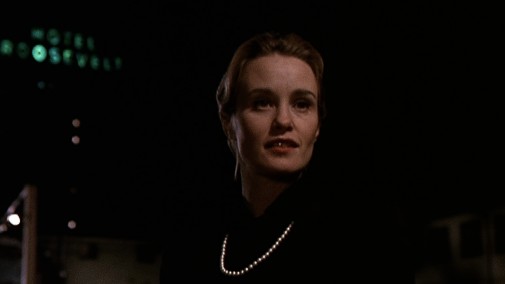
THE RACE
The truth of the matter is that, from the moment Sophie's Choice hit theaters, Meryl Streep had won the Oscar. Jessica Lange was Streep's runner-up, but her victory in Best Actress was always a near impossibility, especially when Tootsie gave the Academy a handy way of honoring both women. The New York Film Critics Circle was the first organization to devise a way of honoring both when they deemed Lange a supporting actress for Tootsie and gave her the corresponding prize. Most of the awards bodies that followed did the same, including the Academy, which doubly nominated Lange but gave her the gold for Tootsie.
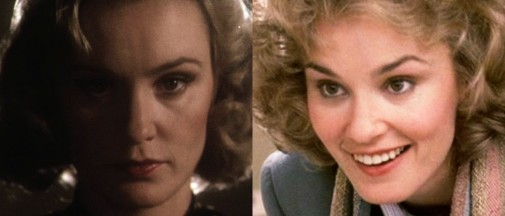
The other Best Actress nominees, regardless of their exemplary efforts, were non-starters. Missing was a much-ballyhooed polemic that brought with it the Palme d'Or and heaps of great reviews, guaranteeing Sissy Spacek a spot on the line-up. Still, she was never a contender for the win, having conquered the Best Actress Oscar two years prior for Coal Miner's Daughter. Julie Andrews was another previous winner and, in her case, the outré premise of Victor/Victoria as well as its perceived lightness as a musical comedy combined to rob her of any real chance at conquering the statuette.
As for Winger, she got the nod by starring in one of the year's most successful movies, An Officer and a Gentleman. In it, she gave a riveting performance which she would, nonetheless, top the very next year on the Best Picture-winning Terms of Endearment. Even Debra Winger's parents said that they were happy for their daughter but believed Meryl deserved the Oscar when they were interviewed for People magazine. The only person who seemed to be legitimately sour about the turn of events was Teri Garr who considered Lange to be the leading lady of Tootsie. After all, had Garr been the picture's sole nominee in that category, she probably would have won.
THE AFTERMATH
Both Jessica Lange and Meryl Streep have had luminous careers since this Best Actress showdown. The fading glamour that comes of age put a bit of a damper on Lange's movie career, but she quickly pivoted to TV where she has found work befitting her status and her talents. Before those small screen adventures, however, she'd still win a Best Actress Oscar in 1994 for Blue Sky. While not wanting to overstate the importance of Frances in the actress's history, it's safe to assume that her loss of the Best Actress prize back in '82 helped her win this second little golden man.
As for Streep, she is the most nominated actor in the History of the Academy Awards, and also a triple winner. They're both living legends.
WHO SHOULD HAVE WON?
It's surprising how difficult it is to articulate the wonders of Lange's performance in comparison to Streep's. The controlled nature of Sophie is perhaps easier to process than the primordial rage of Frances. In this case, I shall vote for the performance that most confounds and fascinates me, making Jessica Lange the rightful champion for Frances.
Who's your choice for the Best Actress of 1982?